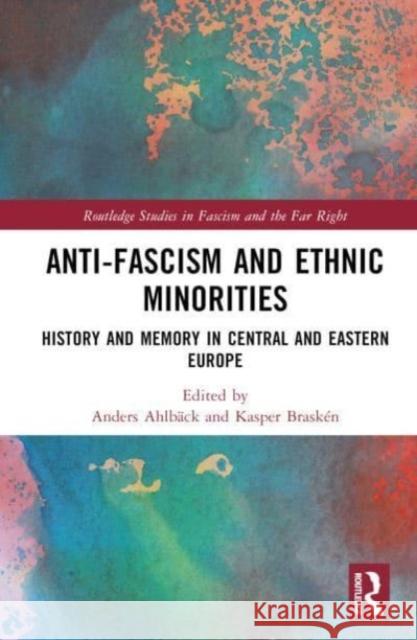Anti-Fascism and Ethnic Minorities » książka



Anti-Fascism and Ethnic Minorities
ISBN-13: 9781032490380 / Twarda / 2023 / 336 str.
Anti-Fascism and Ethnic Minorities
ISBN-13: 9781032490380 / Twarda / 2023 / 336 str.
(netto: 673,60 VAT: 5%)
Najniższa cena z 30 dni: 653,11
ok. 16-18 dni roboczych.
Darmowa dostawa!
Anti-Fascism and Ethnic Minorities explores how, and to what extent, fascist ultranationalism elicited an anti-fascist response among ethnic minority communities in Eastern and Central Europe.
'Anti-Fascism and Ethnic Minorities is a highly original analysis of the resistance to fascism coming from members of ethnic minorities who sought to defend their cultural identities against the homogenizing tendencies of fascism within nation-state contexts. So far, ethnic identities have been considered mainly as a major ingredient of fascist identities. However, as this volume powerfully underlines, they could also play a vital role in anti-fascist resistance movements across a wide range of North-central and East-Central and South-Eastern countries of Europe. Scholars interested in questions of ethnicity, fascism and nationalism will find much thought-provoking material here.'
Stefan Berger, Professor of Social History and Director of the Institute of Social Movements, Ruhr University Bochum, Germany
'This collection offers fascinating and refreshing views on the relationship between anti-fascism and the mobilisation of ethnic minorities during the interwar period and the Second World War. Based on new evidence and focusing on forgotten actors, this volume will become a benchmark in the study of the Janus face of minority nationalism.'
Xosé M. Núñez Seixas, Professor of Modern European History, University of Santiago de Compostela, Spain
'Anti-Fascism and Ethnic Minorities is an exciting new volume that explores the complex relationship between ethnic minority politics and anti-fascism in Central and Eastern Europe. Individual contributions give depth and breadth to this important subject and explore the richness and diversity of various anti-fascist movements throughout the region. Focusing mostly on the interwar period, but also discussing the important issues of postwar antifascist legacies and challenges, this volume is a very valuable addition to the scholarship on fascism, anti-fascism, as well as ethnic politics in Central and Eastern Europe.'
Jelena Subotić, Professor of Political Science at Georgia State University, USA
'Anti-Fascism and Ethnic Minorities advances greatly our understanding of two of twentieth century Europe's fundamental experiences, fascism and anti-fascism. The great merit of the collection of essays is to offer us a broader definition of anti-fascism in terms of ethnicity, ideology, geography and forms of action that considers fascism and the anti-fascism that reacted against it as multi-faceted, pan-European phenomena.'
David Ward, Professor of Italian Studies, Wellesley College, USA
Introduction: Divided against themselves? Ethnic minorities, nationalism, and fractured anti-fascist identities Part 1: Borderlands, minority nationalism and anti-fascism 1. The ethnic roots of European anti-fascism: The Slovenes and Croats in interwar Italy 2. Resistance to the extremes: The facets of the Ukrainian National Movement in interwar Eastern Galicia 3. Anti-fascism and the nationality question in the ethnic Romanian-Hungarian borderlands: The case of Satu Mare 1930–1938 Part 2: Minorities between anti-communism and anti-fascism 4. The cohesive and dividing power of anti-fascism: Language and class among Finland-Swedes in the 1920s–1940s 5. The communist discourse on minorities in interwar Romania and its practical implications for the anti-fascist fighters Part 3: Intellectuals, minorities and anti-fascism 6. Hugo Valentin and the emergence of Swedish-Jewish anti-fascism: From the 1920s to World War II 7. Between fascism and Stalinism: Wolfgang Steinitz and anti-fascist Finno-Ugric scholarship in the 1930s–1950s 8. Mihail Ralea as anti-fascist and defender of ethnic minorities in interwar Romania Part 4: Minorities in the resistance to Italian and German occupation 9. Materiality, gender, and ethnicity in Jewish anti-Nazi resistance in German-occupied Lithuania 10. The role of ethnic minorities and the diaspora in anti-fascist resistance in Albania 11. The anti-fascist oppositions to the Organization of Ukrainian Nationalists and the Ukrainian Insurgent Army Part 5: Ethnicity in collective memories of anti-fascism 12. Anti-fascist resistance, antisemitism and complex Jewish identities: Postwar political trials in Hungary and Czechoslovakia 13. Remembering and forgetting Jewish anti-fascism in Bulgaria 14. Sites of resistance: Memory, ethnicity, and anti-fascism at the Trieste lager
Anders Ahlbäck is a Lecturer in History at Stockholm University, Sweden. His previous books include Manhood and the Making of the Military: Conscription, Military Service and Masculinity in Finland, 1917–39 (Routledge, 2014).
Kasper Braskén is a Researcher in the History Department, Åbo Akademi University, Finland. His previous books include the co-edited collections Anti-Fascism in the Nordic Countries (Routledge, 2019) and Anti-Fascism in a Global Perspective: Transnational Networks, Exile Communities, and Radical Internationalism (Routledge, 2021).
1997-2026 DolnySlask.com Agencja Internetowa
KrainaKsiazek.PL - Księgarnia Internetowa









